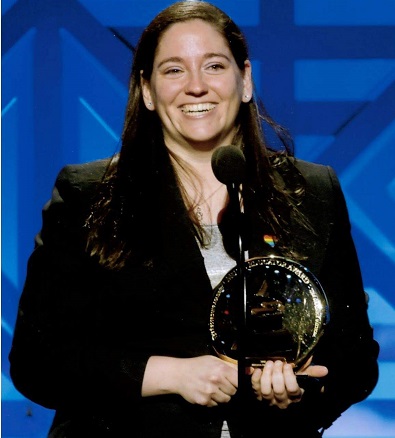
By Patricia Caso/May, 2019
In 2014 Ellen DeGeneres’ television show featured Melissa Salguero, a music teacher at the challenged elementary school P.S. 48 in the South Bronx, New York. Ellen invited her after seeing a Youtube video of Melissa and her students seeking funds to replace stolen instruments from a recent burglary at their school. Ellen gave them $10,000 worth of instruments plus a $50,000 check!
Melissa is also the 2018 Grammy Award-Winning Educator of the Year, 2019 Finalist for World Teacher of the Year, 2013 Lincoln Center Teacher of the Year to name a few accolades.
“When my students see my recognitions and where it’s all gone with their help, they see that anything is possible. I tell them all the time that nothing is impossible.” Melissa Salguero
Melissa considers her 675 students her most important prize. Intrigued by her unconventional approach and obvious passion for the kids, I wanted to find more insight beyond her hard won awards.
Melissa took time out of her “off” week to speak about her creative efforts that have led to success in and out of the classroom and how that video came to be….
EYE: You have won countless awards for being an outstanding music teacher. What is it about music that so inspires you?
MELISSA: Music is one of those things you connect with on a deeper level. Have you ever felt an emotional connection to an equation, a math problem? Maybe you felt stress from memorizing.
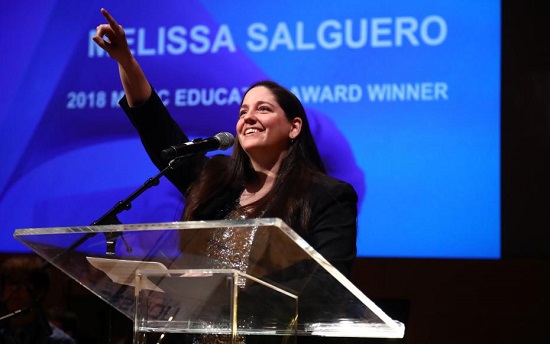
Jan. 2018/Photo: The Grammy Museum
It’s something that gives so much, is unique and talks to the heart of the person. One of the most beneficial things about music, even for me in my personal life, is that music has given me the life skills that I need for my future.
EYE: How did music help you?
MELISSA: When I was growing up I struggled with school. I was dyslexic. Numbers and reading were difficult; sometimes I flipped things around. The one place where I didn’t struggle was when I picked up my trombone. I felt what it was like to be successful.That changed my perspective because I learned I could be successful in another way.
That’s really at the heart of why I teach music. It’s like having a blank canvas with the students and not telling them what to draw but creating something together.
I am just leading them along the way. Music gets my kids to school, keeps them motivated and gives them an incentive to struggle.I know that sounds weird but a lot of times students give up if they are struggling. Music shows them that the more you do something, the better you’ll get.
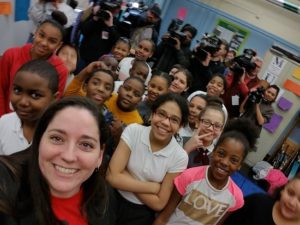
EYE: Describe the school in the South Bronx you work in and the kids you work with.
MELISSA: The first thing I want everyone to know about my kids is they are actors, singers, going to be lawyers one day, hopefully teachers, doctors, whatever they want to be.
They have dreams. Many times statistics and numbers get in the way of that.
If you want to talk about numbers and statistics, the numbers don’t look good. Hunts Point where I teach is an area that is economically very disadvantaged. It’s an industrial area where semi-trucks are coming in all hours of the day and night.
This leads to a very high rate of childhood asthma, which has also led to the Citizen’s Committee finding that Hunts Point is the most at-risk neighborhood for children in all of New York City. It’s not a happy place when you look at that.
But, when you look at other numbers like my attendance numbers for a music program that is at 95%-98%, it’s really impressive. In a neighborhood like this, it’s challenging to get the kids TO school.
What my music program is doing is giving them an incentive to be at school, on time and really loving coming to school.
EYE: How did you get to P.S. 48?
MELISSA: I actually taught a year in Florida before I came up to New York. I ended up working for a program called Education Through Music and they were the ones who put me at P.S. 48. They said they were going to create a music program.
I’ll never forget the first day when I walked in….nothing, there was nothing….not even a projector or a white board to work with. No piano in the room, nothing.
EYE: What on earth did you do?
MELISSA: I went in with my guitar. I tried to teach the kids a folk song, a funny song, that I really enjoyed learning in camp. They didn’t connect and I said, “Uh, oh! I’m sinking.”
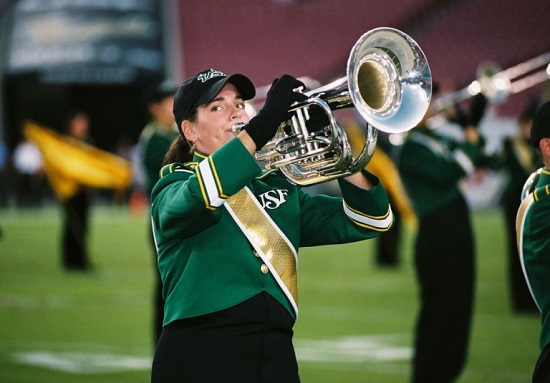
So I decided to play the only song I knew at the time which was “Don’t Stop Believing” by Journey and that became our anthem. That became the message that I wanted to give the kids every day.
Then, I started writing grants, any grant I could apply for; I do, even now. My students needed instruments. None of the students have to pay to rent their instruments. It’s like my gift to them to be part of the program.
In most cases, people have to rent instruments and it can cost $200-$300. One of my goals was to eliminate that barrier to participation. “Oh, I can’t do it because it’s too expensive.”
EYE: You seem to have a unique approach to teaching. Do you consider yourself an unconventional music teacher?
MELISSA: Absolutely! I make music with bananas and play doh; we talk about science connections (which happens to be one of my passions); we’ll talk about circuitry and unconventional music like John Cage’s “433,” which is 4 minutes and 33 seconds of… silence!
So, we have a debate, “Is this music?” What do you think he wants to communicate with that? Some people say that’s not music. Showing the students that John Cage was trying to make them listen to sounds around them is a lot of fun. So I would say I am very unconventional.
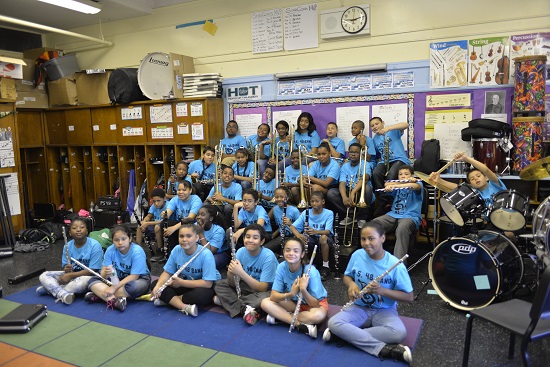
EYE: Can learning music translate to other subjects?
MELISSA: Music participation can directly impact any class. Take math for example. Rhythms are fractions. Have you felt what a fraction feels like or sounds like? As soon as I make that correlation with the kids, they understand it. They understand fractions better.
Vocal fractions are just different notes that mean the same thing. I’ve done crazy stuff where I’m dressing up as Albert Einstein. I brought in a Tesla coil to show the kids that electricity has sound. Then we talk about what electricity is and how circuits work.
Last year I took a carrot and drilled a hole in it and I made a recorder out of it. I love watching the kids faces when I am doing the experiment. “Oh, I don’t believe it!” they say, and they will carry moments like this with them.
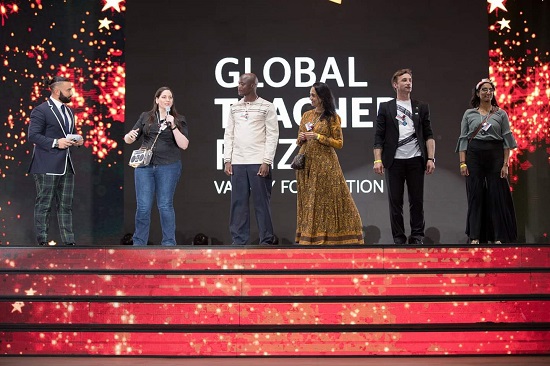
EYE: Does music impact real life?
MELISSA: I’ve seen so many kids just give up. They don’t go past the point of being uncomfortable. Kids want immediate satisfaction. They want things to come easily and when it doesn’t, they move on to the next thing. That’s not what music is about. So even the act of participating or learning the instrument by yourself is the practice of struggling and persevering.
When you get into playing music with a group, then you have the social aspect. How do you play this song with a group of people if you don’t like them? Or, what if you have a problem with them? What does it mean to be a part of team?
Those issues at the heart of what I call my secret lessons. My main objective, of course, is to teach music. By my secret lesson is to teach them about life.
EYE: With all the awards and success you now have, why stick it out in such a challenging situation?
MELISSA: I heard a quote that says there are talents all over the world, every location, but opportunity is not. One of the reasons I’m there is because those kids deserve an opportunity, just like everybody else. They have talent.
We are performing a full Shakespeare play with kids in the South Bronx. And, it’s good. Where you grow up should not depict what kind of opportunities you have in life.
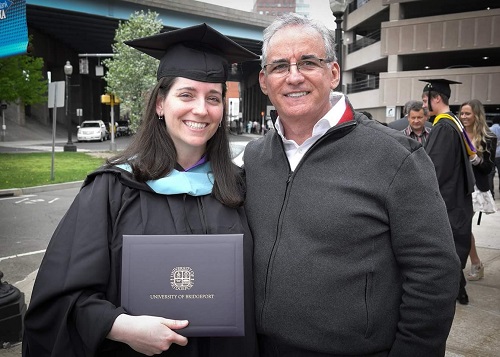
in Elementary Ed with father George Salguero/Photo: George Salguero
EYE: Who inspired you to be the music teacher you are today?
MELISSA: First of all, my parents have always encouraged me and nurtured my creativity. They bought me a Casio keyboard for Christmas one year and that was it! (My parents aren’t musicians; my dad can play the radio. (laughs))
Not having the pressure of “You’re going to music lessons” really worked for me. I also had a 5th grade teacher, Miss Debbie Bower, who was an inspiration for me when I was really struggling in school with dyslexia.
I wanted more than anything to become part of Safety Patrol. It’s like a Hall Monitor in elementary school. I wanted to have that bright orange belt and walk around helping. One day she pulled me aside with my parents and she said she wanted to make me a Safety Patrol. I will never forget that day when I learned that someone believed in me, even when I didn’t believe in myself.
It was a beautiful moment and changed my life. I knew I wanted to help others and serve others because that was the job of Safety Patrol. So I learned how helping others would have an impact.
EYE: How do you measure your success?
MELISSA: I measure moments with my students, moments when I have a student come to me who wrote a song and she or he wants me to play the piano for them, or moments when a student brings me lyrics she or he heard and wants to share it with me.Those are non-academic ways of measuring one’s teaching. Those are priceless.
There was a moment I understood what my impact was after the school break-in in 2013. We lost $30,000 worth of equipment. My students chose to respond to that tragedy by writing music.
At that point, I thought they are really catching on and understanding what I am doing. I am not aiming to make them all musicians. I want them all to be musical people. And I want them to have an open mind, be resilient as well as acceptance for not only music but also for each other.
EYE: What have the kids taught you?
MELISSA: Ohhhh… They taught me a lot. I can’t do this question without crying. They taught me to believe in myself, even when I didn’t; it’s similar to how my teacher believed in me in 5th grade. Going back to the break-in, I wasn’t sure how we were going to continue the program after that.
But when they came to me with the lyrics to the song they wrote, “We Will Rise,” I was so moved and so touched. I said “Okay, we CAN do this!” They taught me to persevere; they taught me about true kindness.
That incident was just so unfair. Instead of an eye-for-an-eye mentality, which I tell them makes the world blind, they combatted it with kindness.
EYE: What advice would you give new educators that you’ve found to be tried-and-true?
MELISSA: Adaption is important along with respect, trust and patience, which are the cornerstones of my teaching approach.
Respect: If you want students to respect you, you don’t need to be a drill sergeant. By yelling at them, they are going to yell back. So I don’t yell…ever. They learn how to treat each other with respect as well.
Trust: This is what you do over a period of time and with consistency. So, when a kid is having a bad day and they curse me out, I’m not going to say “How dare you? You are going to the Principal’s office. You are getting a suspension.” No, I say, “Are you okay? Do you need a moment? What can I do for you?” In that attitude shift, they trust me.
Patience: For example, directions don’t always sink in the first time. So, if it takes 20 times…that is a kindness they like and they’ve told me so. They will remember that before how to read notes for an instrument.
EYE: Ultimately what has this job meant for you?
MELISSA: It’s meant the world. It’s taught me so much about life in general. It’s showed my students in the South Bronx that they can be in the South Bronx and change the world.
You want to play this song? Here’s what you need to do to get there. I will help you. For me, it means hope for the future of the neighborhood and hope for the future for my kids. I don’t want them to grow up and not be represented in the world.
I want them to be inspired and I want other teachers to be inspired. I want teachers who are struggling to see or hear my story and say okay, I’m going to get through this. Those are the things I hope for and what it has meant to me.
EYE: The future’s hope is bright with inspiring teachers like Melissa Salguero making such a positive impact every day. Congratulations and may every student and teacher keep believing!
TWITTER: SalgueroMusic
PS48Music
FACEBOOK: SalgueroMusic
INSTAGRAM: SalgueroMusic
###



Leave a Reply